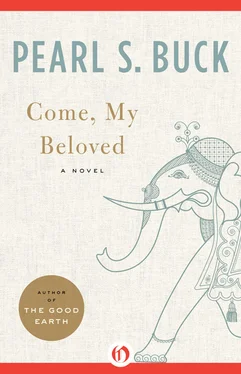Without knowing how it happened they found themselves outside the huge room in the marble corridor again and on their way to the dining room. Behind them Wahdi was bustling about the rooms, opening the vast teak wardrobes, one after another, and deciding where his masters’ garments should hang.
“So and so and so,” he was humming like a zealous bee.
“I can see we have a manager,” David said. “I didn’t even get to change my clothes.”
“Ha!” MacArd said. He had already forgotten Wahdi, and with his pocket guidebook in his hand he was studying a map as he walked. Between him and the map came a sudden memory of his dead wife’s face as she had looked on their last trip together. Wait, it was in London, and he had taken out a map then as now, and had begun to plan the hours ahead, but aloud and to her.
“Oh dear,” she had sighed, pouting her pretty mouth, “I must have some time for doing nothing, you monster!”
He had been amused.
“How can one do nothing?” he had demanded. “Something but not nothing you are compelled to do by the very nature of time. There is no such thing as nothing.”
“Oh, but there is,” she had insisted, and he could see her lovely wilful face, the eyes so dark under the dark soft hair.
Well, she was right. There could be a nothing, and it was death, her death. He was tortured day and night by the need to believe that somehow and somewhere she still lived. While she had lived he had not needed faith but now he must find it again as once he had found it in his father’s manse. His father had been a country preacher, a simple powerful man, who had turned evangelist after he had come home from the war. In MacArd’s childhood faith was as plain as poverty, as simple as bread, as inevitable as birth and death. He had grown impatient in his adolescence, but his father was a severe man, and he had struck off for himself after a quarrel, and early in the struggle for what he had decided was success, he had lost what his father called religion. He was already a successful young businessman when he married Leila Gilchrist, the daughter of his senior partner, and with her he began to go to church again on Sunday, a very different church from the country church where his father preached of heaven and hell and the immortality of the soul.
The night after Leila’s funeral, in his sleepless need to know that she lived though her beloved body lay where he had seen it placed that day in the earth, he had called up Paul Barton, the rector.
“Barton,” he had said hoarsely over the telephone. “It’s MacArd.”
“Yes, Mr. MacArd. What can I do for you?”
“Can you assure me that my wife is really still alive somewhere?”
“I believe that she is, sir.”
“Have you proof?”
“I have faith.”
“Why don’t I have it? I’m a member of your church.”
“A very generous one,” Dr. Barton had said in his rich pulpit voice.
“Then why can’t I believe she is alive?”
“You must simply affirm that you believe,” the minister replied. “Affirm it and faith will follow.”
Well, he had affirmed it over and over again. Leila could not be dead. Still, he was a practical man and there was the matter of the body. No one could deny decay. So what would she look like as a spirit and would it be the same? He wanted everything to be the same. Either Leila existed or she did not, and his willing her alive had nothing to do with the facts, as far as he could see. He had not thought of his father and mother for years, for they had died before he and Leila were married, but now he almost wished his fierce old father was alive again. His father had always seemed to know what he believed and why.
He put the map away and they went downstairs, he and his son, in silence. The boy was always silent these days, missing his mother, doubtless, though he never mentioned her.
“Let’s go out right after we eat,” he said abruptly.
“Very well, Father,” David said.
The lobby was almost empty now. Only the maharajah remained, surrounded by his bright flock, while his business manager, a Eurasian, argued at the desk with the clerk.
They went into the vast dining room and sat down at a table by the window and an Indian servant in a white uniform and a red sash appeared at once. Over their heads an immense punkah moved to and fro, and stirred the idle air.
The sun burned in a blue-white sky as they stepped out of the hotel. MacArd had bought sun helmets in London for them both and David had fetched them from upstairs after their meal but nothing protected their faces from the upward glare of the streets, crowded though they were with people in every variety of costume and color. No white people were to be seen except an occasional carriage of English ladies going out to make their noon calls, a strange custom which had its sense, as the guidebook had told them, only because everyone later in the day went to the parks and the clubhouses to enjoy the coolness before night fell.
“Can you tell one native from another?” MacArd inquired of his son, to make talk. One of his most difficult tasks now was this burden of conversation. While Leila had been alive they had not known that it was she who kept communication constant among the three of them. Her laughing comment on all they saw and did had provided the articulate meaning of their life together. Now without her translation of life into words there were times when MacArd felt his son almost a stranger, or would have except that David, trying to be friendly, answered his slightest effort.
“I suppose you know what every one of them is,” David replied.
His father’s persevering study of the small library of books on India which they had brought along had moved him at times to secret shame and so to mild teasing. But he could not fix his mind on reading. His mother’s death had left him in apathy.
“That’s a Pathan, I’ll guess,” MacArd announced, nodding in the direction of a handsome aging man, his dark skin set off by a snow-white cotton garment, his head wrapped in a small turban. “That one,” he went on, “is Marathi.” The Marathi wore loose white trousers and a coatlike tunic, and his turban, entwined with a golden cord, spread wide over some sort of hidden shape.
“We see only men,” David said idly. “I suppose the women are in purdah or something.”
Nevertheless at this moment they saw a group of Marathi women emerging from a doorway, wrapped in vivid saris and wearing jewels in their left nostrils, a strange and pretty sight. The Marathi man shielded them and herded them into a carriage and they drove toward the crowded native city.
Toward this city MacArd now abruptly turned, away from the sea and the pleasant parkways of the English. It was hot and he summoned a small vehicle, a gherry, drawn by a brisk white bullock.
“We can postpone Malabar Point,” he said to David. “I’d like to see where the people live.”
They sat in silence in the rocking uncomfortable vehicle, facing each other upon hard wooden seats, and the parks and the wide streets gave way to narrow alleys, the handsome English buildings to small two-story houses of brick or stone, whose carved and painted fronts made them look like toys. The hot air steamed with scents and reeks, pepper and acid mingled with the bland fragrance of flowers and fruits. People crowded the streets, walking, standing, leaning against the walls, or lying on the pavement, curled in sleep. They were dark, and yet not all of the same darkness. Sometimes a child had a creamy skin, sometimes a young boy’s cheek was almost white. Faces turned to gaze at them with eyes large and liquid and soft, except occasionally those deep set in the hawk-like bead of a Pathan or a Sikh. They saw no white man in the mingling crowds of Hindus, Muslims, Malays, Parsees wearing tall hats of horsehair, Afghans, Chinese, Japanese, Tibetans and even black men from the southern coasts. The colors were vivid and random, a pink turban and a green scarf, a purple robe and a tunic of crimson velvet and gold, orange and scarlet mingled with blue and yellow and rose, and now in the native city, the common women came and went, draped in bright and graceful saris. Their brown faces were decorated with necklaces, earrings and tiny jewels in the nostrils and their bare arms and ankles tinkled with bracelets and anklets. To the Americans, they were a pageant to look at and to pass.
Читать дальше












